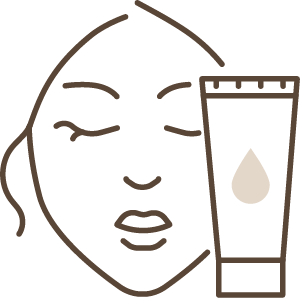Your Solution to Melasma
Reclaiming Beautiful, Even Skin
Are you struggling with melasma and searching for an effective solution to regain your skin's natural beauty and radiance? Look no further. At Aesthetic Artistry, we understand the challenges that melasma can present, and we're here to provide you with a comprehensive approach to managing and treating this skin condition. Discover how our tailored solutions can help you achieve clear and even skin tone.

Understanding Melasma
Melasma is a common skin condition characterized by the development of dark, irregular patches on the face, particularly on the cheeks, forehead, chin, and upper lip. It is often triggered or exacerbated by hormonal changes, sun exposure, and genetics. Melasma can affect individuals of all skin types but is more prevalent in those with darker complexions.
Our Approach
At Aesthetic Artistry, we take a personalised and science-backed approach to melasma treatment. Here's how we can help you address melasma and achieve a more even skin tone:
Personalised Assessments
Tijan conducts a thorough assessment to determine the type and severity of your melasma. This allows for the creation of a customised treatment plan tailored to your unique needs.
Targeted Treatments
We offer a range of advanced treatments, including topical therapies, chemical peels, laser therapy, and specialised skincare products. These treatments target the underlying causes of melasma, reducing pigmentation and promoting an even skin tone.
Sun Protection
Sun exposure is a major trigger for melasma. We emphasise the importance of daily sun protection and provide guidance on the use of sunscreen, protective clothing, and sun avoidance to prevent further pigmentation.
Lifestyle Guidance
We offer lifestyle recommendations to help you manage melasma triggers, such as hormonal fluctuations and stress, and to maintain the results of your treatment.
Ongoing Support
Achieving an even skin tone and managing melasma requires consistent care. We're dedicated to providing ongoing support, adjustments to your treatment plan as needed, and guidance on long-term maintenance.
Aesthetic Artistry
Why Choose Us
Experienced
With a proven track record as skin specialist, Tijan has helped countless individuals manage and treat melasma effectively.
Cutting-Edge Technology
Aesthetic Artistry invests time and research in studying the best options of technology to provide you with the most effective and advanced treatments available. No fad following, or machine of the moments here.
Personalised Care
We understand that no two cases of melasma are the same. Our personalised approach ensures that your treatment plan is designed specifically for you.
Proven Results
Countless clients have seen dramatic improvements in their skin after partnering with us. We take pride in helping you regain your confidence.
Don't let melasma affect your self-esteem any longer. Take the first step toward achieving clear and even skin by scheduling a consultation with us today.
Our most popular
Melasma And Skin PIgmentation Treatments
-
Prescribed Dermal Treatment
Our expert dermatologists are here to provide personalised solutions that target the root causes of your skin issues and deliver remarkable results. Discover how Prescribed Dermal Treatments can help you achieve healthy, radiant skin.
-
Skin Needling
Experience Dermapen 4 Skin Needling at Aesthetic Artistry. We understand the power of advanced skin care techniques, and we're excited to introduce you to the transformative benefits of Dermapen 4.
-
Epidermal Peel
Epidermal Peels exfoliate the skin's top layer, revealing fresher, smoother skin underneath and reducing the appearance of fine lines and age spots.
-
Chemical Peel
Chemical peels can help improve melasma by exfoliating the top layer of skin, reducing the appearance of pigmentation, and promoting a more even skin tone.
-
Q-Switched YAG Laser
A versatile laser that offers different wavelengths to target a variety of skin conditions including sun spots, age spots, freckles, pigmentation and some birthmarks.
-
Dermaplaning
Designed to revitalise your complexion, reduce peach fuzz, and reveal a more youthful radiance.
-
Mesotherapy
This treatment is designed to rejuvenate the skin, improve its health, and address various skin concerns, including fine lines, wrinkles, pigmentation, hydration, and overall complexion enhancement. Mesotherapy works by stimulating collagen and elastin production while providing essential nutrients to the skin, resulting in a more youthful and radiant appearance.
-
LED Light Therapy
Discover how LED Light Therapy can effectively address these common skin concerns for a more radiant and rejuvenated complexion.
-
Plasma Pen
Learn how Plasma Pen treatment, (also called “fibroblast” therapy) can effectively address these common skin concerns, leaving you with a more youthful and revitalised complexion.
-
Facial Treatments
-
Microdermabrasion
This treatment is highly regarded for its capacity to enhance skin texture, diminish the appearance of fine lines and discoloration, address acne and excess oiliness, refine enlarged pores, and promote an overall improvement in skin tone.
About Melasma
Frequently Asked Questions
-
What is Melasma?
Melasma is a skin condition characterised by brown or gray-brown patches on the face. These patches often appear symmetrically on both sides of the face and typically affect areas like the cheeks, forehead, bridge of the nose, and upper lip. While melasma is usually asymptomatic and doesn't cause physical discomfort, it can be a cosmetic concern for many individuals.
-
What Causes Melasma?
The exact cause of melasma is not fully understood, but it is primarily attributed to an overproduction of melanin, the pigment responsible for skin color. Several factors are believed to contribute to melasma development, including:
- Hormonal Changes
- Excessive Sun Exposure
- Genetics
- Certain Medications and Cosmetic Products
- Other Factors Like Thyroid Dysfunction
-
Is Melasma More Common in Certain Groups?
Yes, melasma is more commonly seen in individuals with darker skin types, particularly those with Fitzpatrick skin types III to VI. However, it can affect people of all skin types and ethnic backgrounds.
-
How can I Prevent Melasma?
Preventing melasma involves protecting your skin from excessive sun exposure. This includes wearing broad-spectrum sunscreen with high SPF daily, using protective clothing and accessories like hats and sunglasses, and seeking shade when the sun is strongest.
-
Can Hormonal Changes Trigger Melasma?
Yes, hormonal changes, such as those occurring during pregnancy (chloasma or "mask of pregnancy") or due to birth control pills or hormone replacement therapy, can trigger or worsen melasma. These hormonal factors may lead to an increase in melanin production.
-
What Are the Treatment Options for Melasma?
Treatment for melasma may include topical medications, chemical peels, laser therapy, and skincare products specifically formulated to target pigmentation. The choice of treatment depends on the type and severity of melasma, and it's best determined through consultation.
-
Can Melasma Be Completely Cured?
While melasma can often be effectively managed and lightened with treatment, it may not always be completely cured. Some individuals may experience recurrence, especially if triggers like sun exposure are not avoided.
-
Are There Any Side Effects to Melasma Treatments?
The side effects of melasma treatments can vary depending on the type of treatment used. Some treatments may cause temporary redness, peeling, or sensitivity. It's essential to discuss potential side effects with your dermatologist before undergoing treatment.
-
How Long Does It Take to See Results from Melasma Treatment?
The timeline for seeing results from melasma treatment varies depending on the treatment method and the individual's response. Some people may notice improvements in a few weeks, while others may take several months to achieve the desired outcome.
-
Can Melasma Come Back After Treatment?
Yes, melasma can recur, especially if preventive measures such as sun protection are not consistently followed. Maintenance treatments and ongoing sun protection may be necessary to prevent its return.
-
Is Melasma Harmful to My Health?
Melasma itself is not harmful to your health. However, it can be a source of emotional distress due to its impact on appearance. It's essential to seek treatment and adopt preventive measures to manage melasma effectively.
What They Say
Real People, Real Results
Our Partners












